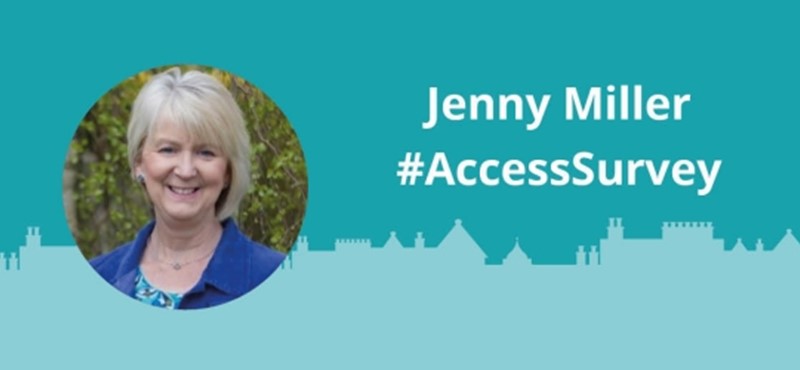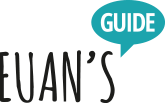Access Survey Insights - Jenny Miller CEO of PAMIS

We hear from Jenny Miller CEO of PAMIS about the challenging themes for the PMLD community and how the Changing Places campaign has been influenced by the pandemic. Jenny spoke to us and gave insight into the the 2021 Euan’s Guide Access Survey supported by Motability Operations which ran in Autumn 2021. Over 2400 disabled people and their friends, families and carers took part.
Do you think disabled access has got better or worse since Covid started?
For the group of people we support those with a profound learning and multiple disabilities access has certainly been worse since COVID. While the rest of the population were able to go back to some form of normal living we found our community were still locked away. Most risk assessments were not carried out in partnership with family carers who are the experts in infection control and this led to either exclusion and closure of services and venues or limited assurance of the precautions in place. However on the positive the restrictions for the general public certainly heightened awareness of how the group of people we support have to live every day. Not being able to access an appropriate toilet is everyday life for our group, but it certainly seemed to open the eyes of the public when suddenly they had no access to a toilet when out and about.
Families have struggled to access support and services do you see these returning to pre-Covid levels?
No and this is very concerning. As mentioned in the previous question the community we support were held in lock down far longer than any other part of the population. They saw services withdrawn overnight and many are still not receiving the services they were involved in pre pandemic. Day services in some areas remain closed or are offering a fraction of what the person had before COVID. Going to a day service where you meet your friends and have your therapeutic interventions once a month when it used to be 5 days a week almost does more harm than good. There is a fear within the community that some services will never reopen and the pandemic has been used to move this agenda forward. Family carers have found themselves caring 24/7 with little or no respite and they are exhausted. Again the support for many has not returned to the levels pre-pandemic and we now have a social care workforce crisis. Transitions to adult services ceased and there are still some young people within our community without a social worker to support this and indeed with nowhere to transition into as day opportunities are scarce or non-existent.
What has been the most challenging thing or theme for the PMLD community?
Isolation, invisibility, abandonment, forgotten. These are all words we frequently heard/hear. This group were forgotten in policy and guidance, and we fear that not enough lessons will be learnt going forward. People had services taken away leading to a serious deterioration in health and wellbeing. Individuals with profound learning and multiple disabilities had limited or no therapeutic interventions and consequently many of them have lost communication and physical skills that families fear will never be regained. The lack of services and support has had detrimental impact on the whole community and has left families in untenable positions. Some families are now having to consider residential care for their loved one because they just can’t cope anymore. Not being able to get out has also been a huge issue and highlighted a lack of understanding and individualised personalised care and decision making processes. For the group we support in particular access to the outdoors is really important not least for the health benefits and ability to stimulate senses that are impaired. Blanket decisions has negatively impacted on this group. In addition, although we did provide digital support and solutions this was not an option for many of the families and people we support. Digital exclusion was an issue, and we need to remember that virtual is not a solution for everyone.
How do you feel the Changing Places campaign has been influenced by the pandemic?
As an organisation we worked with families to support safe and accessible outdoor events. They supported our development of a risk assessment process and provided invaluable insights into minimising risks. The Pamiloo – mobile changing places toilet - was part of the solution and we worked with companies like DEW products to ensure we used effective yet safe sanitising products in the vehicle which then enabled this group to access outdoor events. Families highlighted that the activities and support were a lifeline. As your research highlights getting outdoors is a priority and we were really pleased to see an increase in requests for support from a number of council areas and local charities and initiatives looking to develop their own changing places toilets. Enquiries and support and indeed registration of new facilities remained constant even through lock down. As I mentioned previously in a way COVID put a spotlight on issues that our community face every day, the public suddenly realised what it was like to have to plan your trips out via the toilets that were or weren’t open. Cleanliness also highlighted in your survey remains a concern and we are including in our bespoke training and information for those developing a changing place toilet about the need to consider how to keep the changing places toilet environment safe. We had an increase in virtual practice placements for health and social care practitioners and this has enabled a wider education about changing places toilets which remarkably so many practitioners in our current and future workforce know nothing about. Changing places toilets are the key to enabling the group of people we support to access their communities and these online placements embedded this knowledge in each of the students we supported. Hopefully the next generation will get it right for us all!.
Jenny Miller is CEO at PAMIS, Member of the Scottish Government Leadership Group for policy for people with a learning disability, Co-Chair of the UK Changing Places Toilet Consortium and RSA Fellow. You can follow her on twitter @jennympamis
For full results of the Euan's Guide Access Survey supported by Motability Operations, please visit www.EuansGuide.com/AccessSurvey


 Follow Euan's Guide on Instagram
Follow Euan's Guide on Instagram
 Follow Euan's Guide on LinkedIn
Follow Euan's Guide on LinkedIn
 Follow Euan's Guide on Facebook
Follow Euan's Guide on Facebook


Comments
You have to be signed in to leave a comment.
Login / Signup